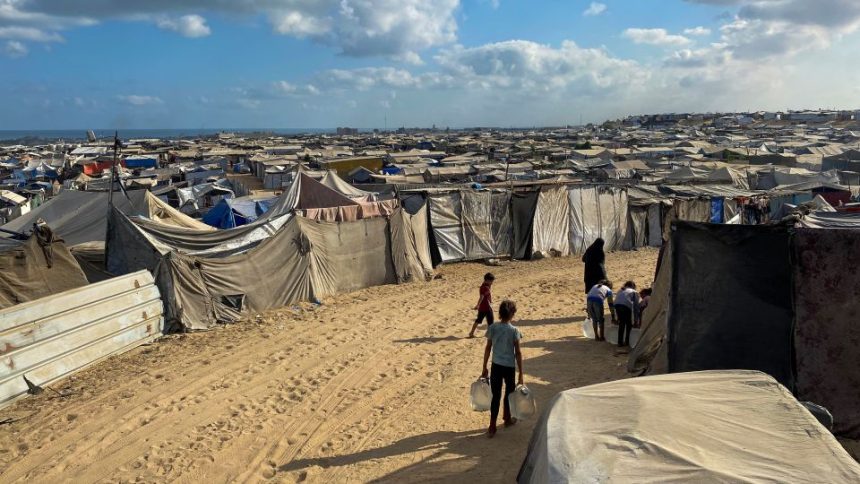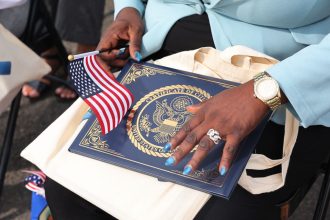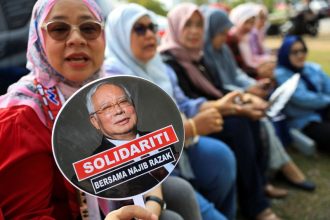Israel is in discussions with South Sudan about the possibility of resettling Palestinians from the Gaza Strip to the war-torn East African country, part of a wider effort by Israel to facilitate mass emigration from the territory left in ruins by its 22-month offensive against Hamas.
Six people familiar with the matter confirmed the talks to The Associated Press. It’s unclear how far the talks have advanced, but if implemented, the plans would amount to transferring people from one war-ravaged land at risk of famine to another, and raise human rights concerns.
Israeli Prime Minister Benjamin Netanyahu says he wants to realize US President Donald Trump’s vision of relocating much of Gaza’s population through what Netanyahu refers to as “voluntary migration.” Israel has floated similar resettlement proposals with other African nations.
“I think that the right thing to do, even according to the laws of war as I know them, is to allow the population to leave, and then you go in with all your might against the enemy who remains there,” Netanyahu said Tuesday in an interview with i24, and Israeli TV station. He did not make reference to South Sudan.
Palestinians, rights groups, and much of the international community have rejected the proposals as a blueprint for forcible expulsion in violation of international law.
For South Sudan, such a deal could help it build closer ties to Israel, now the almost unchallenged military power in the Middle East. It is also a potential inroad to Trump, who broached the idea of resettling Gaza’s population in February but appears to have backed away in recent months.
Israel’s foreign ministry declined to comment and South Sudan’s foreign minister did not respond to questions about the talks. A US State Department spokesperson said it doesn’t comment on private diplomatic conversations.
Egypt opposes proposals to resettle Palestinians out of Gaza
Joe Szlavik, the founder of a US lobbying firm working with South Sudan, said he was briefed by South Sudanese officials on the talks. He said an Israeli delegation plans to visit the country to look into the possibility of setting up camps for Palestinians there. No known date has been set for the visit. Israel did not immediately respond to a request for confirmation of the visit.
Szlavik said Israel would likely pay for makeshift camps.
Edmund Yakani, who heads a South Sudanese civil society group, said he had also spoken to South Sudanese officials about the talks. Four additional officials with knowledge of the discussions confirmed talks were taking place on condition of anonymity because they were not authorized to discuss them publicly.
Two of the officials, both from Egypt, told AP they’ve known for months about Israel’s efforts to find a country to accept Palestinians, including its contact with South Sudan. They said they’ve been lobbying South Sudan against taking the Palestinians.
Egypt is deeply opposed to plans to transfer Palestinians out of Gaza, with which it shares a border, fearing an influx of refugees into its own territory.
The AP previously reported on similar talks initiated by Israel and the US with Sudan and Somalia, countries that are also grappling with war and hunger, and the breakaway region of Somalia known as Somaliland. The status of those discussions is not known.
‘Cash-strapped South Sudan needs any ally’
Szlavik, who’s been hired by South Sudan to improve its relations with the United States, said the US is aware of the discussions with Israel but is not directly involved.
Smoke billows during air strikes in central Khartoum as the Sudanese army attacks positions held by the paramilitary Rapid Support Forces (RSF) throughout the Sudanese capital on October 12, 2024. – AFP/Getty Images
South Sudan wants the Trump administration to lift a travel ban on the country and remove sanctions from some South Sudanese elites, said Szlavik. It has already accepted eight individuals swept up in the administration’s mass deportations, in what may have been an effort to curry favor.
The Trump administration has pressured a number of countries to help facilitate deportations.
“Cash-strapped South Sudan needs any ally, financial gain and diplomatic security it can get,” said Peter Martell, a journalist and author of a book about the country, “First Raise a Flag.”
Israel’s Mossad spy agency provided aid to the South Sudanese during their decades-long civil war against the Arab-dominated government in Khartoum ahead of independence in 2011, according to the book.
The State Department, asked if there was any quid pro quo with South Sudan, said decisions on the issuing of visas are made “in a way that prioritizes upholding the highest standards for US national security, public safety, and the enforcement of our immigration laws.”
From one hunger-stricken conflict zone to another
Many Palestinians might want to leave Gaza, at least temporarily, to escape the war and a hunger crisis bordering on famine. But they have roundly rejected any permanent resettlement from what they see as an integral part of their national homeland.

A child cries as Palestinians gather to receive a hot meal at a food distribution point in the Nuseirat camp for refugees in the central Gaza Strip on May 24. – Eyad Baba/AFP/Getty Images
They fear that Israel will never allow them to return, and that a mass departure would allow it to annex Gaza and reestablish Jewish settlements there, as called for by far-right ministers in the Israeli government.
Still, even those Palestinians who want to leave are unlikely to take their chances in South Sudan, among the world’s most unstable and conflict-ridden countries.
South Sudan has struggled to recover from a civil war that broke out after independence, and which killed nearly 400,000 people and plunged pockets of the country into famine. The oil-rich country is plagued by corruption and relies on international aid to help feed its 11 million people – a challenge that has only grown since the Trump administration made sweeping cuts to foreign assistance.
A peace deal reached seven years ago has been fragile and incomplete, and the threat of war returned when the main opposition leader was placed under house arrest this year.
Palestinians in particular could find themselves unwelcome. The long war for independence from Sudan pitted the mostly Christian and animist south against the predominantly Arab and Muslim north.
Yakani, of the civil society group, said South Sudanese would need to know who is coming and how long they plan to stay, or there could be hostilities due to the “historical issues with Muslims and Arabs.”
“South Sudan should not become a dumping ground for people,” he said. “And it should not accept to take people as negotiating chips to improve relations.”
For more CNN news and newsletters create an account at CNN.com









